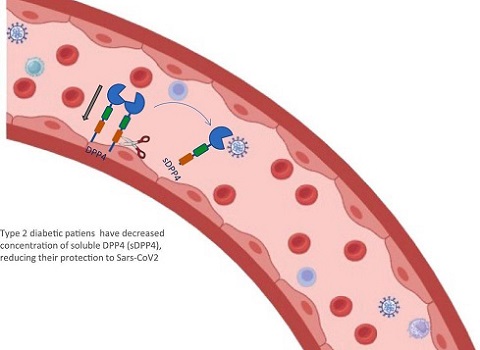Medical News: Spanish Study Shows That COVID-19 Causes Reduced Efficacy Of Gliptins In Inhibiting Dipeptidyl Peptidase 4 (DPP4) In Diabetic Individuals!
Nikhil Prasad Fact checked by:Thailand Medical News Team Nov 28, 2023 2 years, 3 weeks, 11 hours, 23 minutes ago
The study findings could possibly explain the increased COVID-19 susceptibility in patients with type 2 diabetes mellitus (T2DM)
Medical News: As the global medical community continues to grapple with the complexities of COVID-19 and its implications, a recent study conducted by Alcalá University, Spain, in collaboration with the Health Research Institute of Castilla-La Mancha, Ramón y Cajal Institute for Health Research, and the Chemical Research Institute “Andrés M. del Río,” sheds light on a compelling aspect of the disease. This investigation covered in this
Medical News report, delves into the intricate relationship between COVID-19, type 2 diabetes mellitus (T2DM), and the role of dipeptidyl peptidase 4 (DPP4).
 Graphical Abstract
Background
Graphical Abstract
Background
COVID-19, caused by the severe acute respiratory syndrome coronavirus 2 (SARS-CoV-2), has posed unprecedented challenges to global health. Despite the World Health Organization's reclassification of COVID-19 on May 5, 2023, from a public health emergency of international concern, the need for a comprehensive understanding of the virus remains paramount. In particular, the study focuses on the protein DPP4, previously identified as a functional receptor for the Middle East respiratory syndrome coronavirus (MERS-CoV) and speculated to play a role in SARS-CoV-2 infection.
Role of DPP4 in SARS-CoV-2 Infection
While angiotensin converting enzyme II (ACE2) is recognized as the primary receptor for SARS-CoV-2 entry into cells, DPP4 has been proposed as a co-receptor. Bioinformatics analyses suggest that DPP4 may interact with SARS-CoV-2, and recent findings indicate its impact on viral entry and physiopathology. However, the in vivo binding of SARS-CoV-2 to DPP4 is yet to be demonstrated, leaving a crucial aspect of the disease mechanism unexplored.
The Paradox of Gliptins
Gliptins, commonly used as DPP4 inhibitors in the treatment of type 2 diabetes, present a paradoxical relationship with COVID-19. Despite the lower levels of DPP4 activity and concentration observed in COVID-19 patients, gliptins have shown mortality improvements and anti-inflammatory effects in diabetic patients with COVID-19. This raises intriguing questions about the interactions between DPP4, gliptins, and SARS-CoV-2.
Study Design and Methodology
The research involved the analysis of 189 serum human samples, categorized into six clinical groups: controls,
T2DM, T2DM + gliptins, COVID-19, COVID-19 + T2DM, and COVID-19 + T2DM + gliptins. The team measured DPP4 protein concentration and activity using Western blot, ELISA, and commercial activity kits. Results were further verified in Huh-7 cellular models.
The research involved 189 patients, including control individuals, type 2 diabetic patients, diabetic patients treated with gliptins, COVID-19 patients, diabetic patients with COVID-19, and gliptin-treated diabetic patients with COVID-19. Demographic characteristics, including gender distribution, were considered in the analysis.
Key Findings
The study revealed a significant decrease in both DPP4 concentration and activity in COVID-19 patients and T2DM patients compared to controls. Interestingly, the ratio of DPP4 activity to concentration was the highest in COVID-19 sera, indicating a compensating mechanism. Supernatants of Huh-7 cells incubated with COVID-19 serum displayed consistently lower DPP4 concentration and activity. Notably, COVID-19 + T2DM + gliptins patients exhibited higher serum DPP4 concentration and activity than T2DM + gliptin subjects, suggesting interference with gliptins.
Discussion
The study delves into the intricate interplay between T2DM, COVID-19, and DPP4, aiming to decipher the role of DPP4 in the physiopathology of COVID-19. The multifunctional nature of DPP4, impacting various physiological and pathological processes, adds complexity to the investigation. The study also addresses the paradoxical effects of gliptins in the context of COVID-19, emphasizing the need for a comprehensive understanding of the soluble and membrane-bound forms of DPP4.
Conclusion
The study concludes with intriguing revelations about the interference in gliptin action on DPP4 activity in diabetic COVID-19 patients. The mechanism behind this interference, involving interactions with SARS-CoV-2 or metabolites in sera, remains to be elucidated. Additionally, the study highlights the unique DPP4 activity to protein concentration ratio observed in COVID-19 sera. Further research is crucial to unravel the complex interactions between DPP4, gliptins, and SARS-CoV-2, providing insights into the underlying mechanisms and clinical implications of these observations.
The study findings were published in the peer reviewed journal: Life Sciences.
https://www.sciencedirect.com/science/article/abs/pii/S002432052300927X
For the latest
Medical News, keep on logging to Thailand Medical News.
